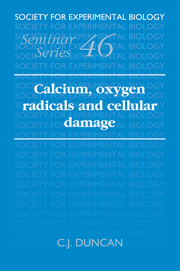Book contents
- Frontmatter
- Contents
- List of Contributors
- Preface
- 1 Are there common biochemical pathways in cell damage and cell death?
- 2 Free radicals in the pathogenesis of tissue damage
- 3 Calcium and signal transduction in oxidative cell damage
- 4 Regulation of neutrophil oxidant production
- 5 Reperfusion arrhythmias: role of oxidant stress
- 6 Biochemical pathways that lead to the release of cytosolic proteins in the perfused rat heart
- 7 Malignant hyperthermia: the roles of free radicals and calcium?
- 8 Free radicals, calcium and damage in dystrophic and normal skeletal muscle
- 9 Ultrastructural changes in mitochondria during rapid damage triggered by calcium
- 10 The importance of oxygen free radicals, iron and calcium in renal ischaemia
- 11 The Rubicon Hypothesis: a quantal framework for understanding the molecular pathway of cell activation and injury
- Index
10 - The importance of oxygen free radicals, iron and calcium in renal ischaemia
Published online by Cambridge University Press: 18 January 2010
- Frontmatter
- Contents
- List of Contributors
- Preface
- 1 Are there common biochemical pathways in cell damage and cell death?
- 2 Free radicals in the pathogenesis of tissue damage
- 3 Calcium and signal transduction in oxidative cell damage
- 4 Regulation of neutrophil oxidant production
- 5 Reperfusion arrhythmias: role of oxidant stress
- 6 Biochemical pathways that lead to the release of cytosolic proteins in the perfused rat heart
- 7 Malignant hyperthermia: the roles of free radicals and calcium?
- 8 Free radicals, calcium and damage in dystrophic and normal skeletal muscle
- 9 Ultrastructural changes in mitochondria during rapid damage triggered by calcium
- 10 The importance of oxygen free radicals, iron and calcium in renal ischaemia
- 11 The Rubicon Hypothesis: a quantal framework for understanding the molecular pathway of cell activation and injury
- Index
Summary
Introduction
Ischaemia encompasses a wide range of clinical conditions and is also an integral part of many surgical techniques, in particular transplantation. Organ retrieval usually involves a short period of warm ischaemia (WI) between cessation of the blood supply and harvesting the organ from the donor. This is followed by a much longer period of cold ischaemia (CI) in which the organ is flushed with and suspended in a cold asanguinous solution for transport to the recipient. The organs are then rapidly reperfused with fully oxygenated blood as soon as the vascular pedicle is reconstructed. Cooling depresses metabolism and very much slows the deterioration of ischaemic organs. However, some organs are particularly susceptible to ischaemic damage and it is currently considered inadvisable to store liver, heart or lungs for longer than 4 hr. Kidneys are usually stored for about 24 hr but storage periods up to 72 hr are not uncommon. There is no definitive safe storage time but rather the longer the period of ischaemia, the less chance there is of an organ functioning immediately upon transplantation. Acute renal failure may occur in transplanted kidneys which become enlarged with a pale cortex and a dark congested medulla and have a drastically impaired excretory capacity. Vascular injury is another possible complication in ischaemically damaged kidneys which are slow to perfuse when revascularised and develop a microagulopathy which results in an outflow block and venous stasis.
- Type
- Chapter
- Information
- Calcium, Oxygen Radicals and Cellular Damage , pp. 165 - 188Publisher: Cambridge University PressPrint publication year: 1991



